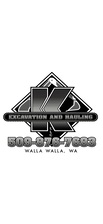
Get matched with top concrete sawing or removers in your area
Enter your zip and get matched with up to 3 pros
Matching on HomeAdvisor


Concrete sawing or removers in Pasco

We are committed to excellence in every aspect of our business. We uphold a standard of integrity bound by fairness, honesty and personal responsibility. Our distinction is the quality of service we bring to our customers. Accurate knowledge of our trade combined with ability is what makes us true professionals. Above all, we are watchful of our customers interests, and make their concerns the basis of our business.
We are committed to excellence in every aspect of our business. We uphold a standard of integrity bound by fairness, honesty and personal responsibility. Our distinction is the quality of service we bring to our customers. Accurate knowledge of our trade combined with ability is what makes us true professionals. Above all, we are watchful of our customers interests, and make their concerns the basis of our business.
FAQs for concrete sawing or removal projects in Pasco, WA
You’ll start by breaking the slab into manageable pieces and hauling the debris away with heavy machinery or sturdy hand tools. For concrete under three inches thick, a crowbar or sledgehammer often does the trick; thicker slabs call for a jackhammer and full protective gear.
Pros bring specialized tools, handle recycling when possible, and finish the job quickly and safely—another reason many homeowners call in a contractor instead of tackling it solo.
You’ll need a permit only if your local building department says so. Small, non-structural projects often slip under the radar and don’t require permits, but major demolition almost always triggers a permit and inspection. Check with your city or county before the first swing of the sledgehammer to avoid fines and delays.
With the right crew and equipment, most concrete demolition wraps up in a single day. Thickness, strength, and square footage are the biggest time factors, so larger or reinforced slabs can stretch the schedule. Pros use specialized tools to move fast without putting nearby structures at risk, keeping the job both safe and efficient.
Start by multiplying the slab’s length and width to get total square footage, then multiply that number by the going rate of $2 to $6 per square foot for slabs up to six inches thick. For thicker concrete, double the square-foot price. Don’t forget to ask whether disposal—costing $50 to $100 per ton—is already in the quote. Checking that line item keeps your estimate realistic.
Yes—think about reinforcement before you pour the replacement slab. Rebar or wire mesh boosts strength and durability on big projects like patios, decks, and driveways, helping the concrete stand up to heavy loads and changing weather. A local concrete pro can tell you exactly what gauge and pattern will give you the best long-term performance.





- Interlocking Pavers for Driveways & Floors - Install
- Stamped Concrete - Install
- Retaining Wall - Install
- Concrete Flatwork - Repair & Resurface
- Concrete Patios, Walks & Steps- Install
- Concrete - Injection Leveling - Mudjacking
- Wood Retaining Wall - Build
- Concrete Finishing, Overlays & Coloring - Apply
- Landscape Curbing - Install
- Interlocking Pavers for Patios, Walks & Steps - Install
- Concrete Driveways & Floors - Install
- Birmingham
- Phoenix
- Tucson
- Fresno
- Long Beach
- Los Angeles
- Modesto
- Sacramento
- San Diego
- San Francisco
- San Jose
- Denver
- Hartford
- Washington DC
- Fort Lauderdale
- Jacksonville
- Miami
- Orlando
- Tampa
- Atlanta
- Chicago
- Indianapolis
- Louisville
- New Orleans
- Baltimore
- Boston
- Detroit
- Grand Rapids
- Minneapolis
- Saint Paul
- Kansas City
- Saint Louis
- Las Vegas
- Albany
- New York
- Asheville
- Charlotte
- Greensboro
- Raleigh
- Winston Salem
- Cincinnati
- Cleveland
- Columbus
- Oklahoma City
- Portland
- Harrisburg
- Philadelphia
- Pittsburgh
- Providence
- Memphis
- Nashville
- Austin
- Dallas
- El Paso
- Fort Worth
- Houston
- San Antonio
- Salt Lake City
- Norfolk
- Richmond
- Virginia Beach
- Seattle
- Madison
- Milwaukee




